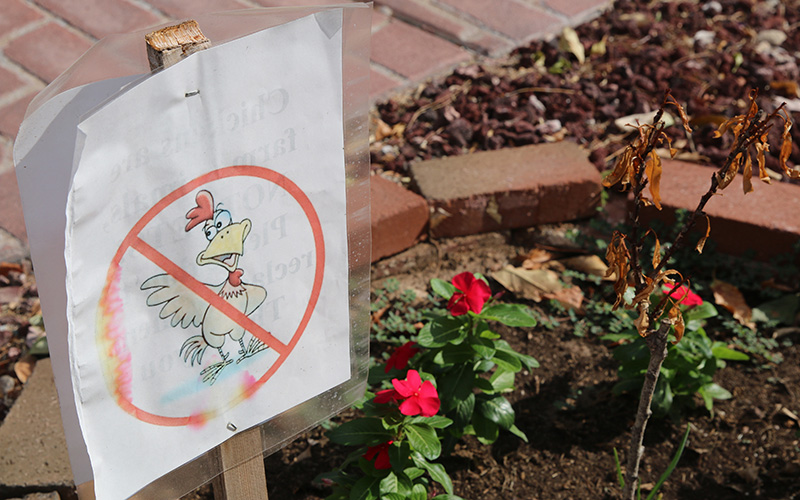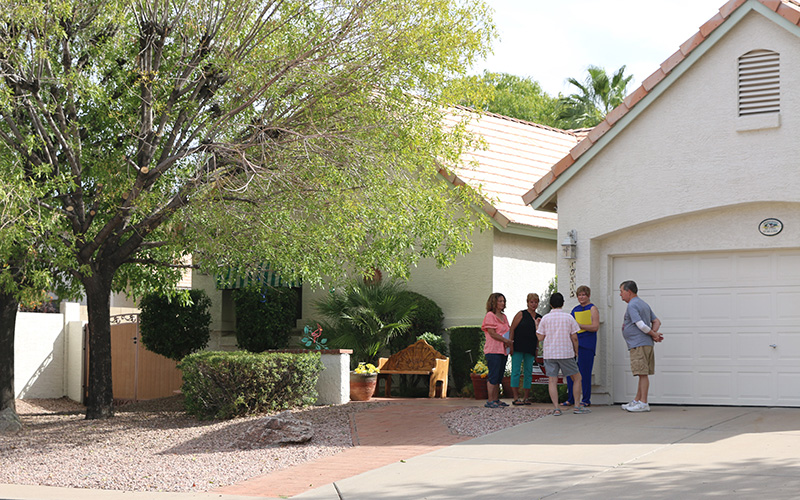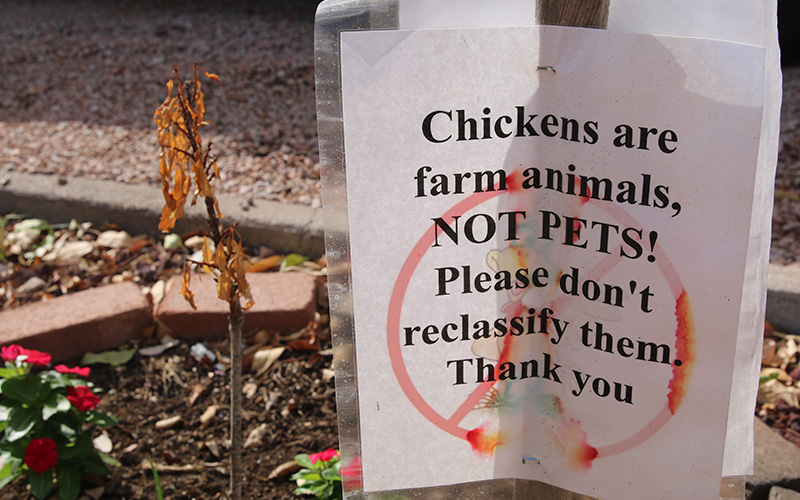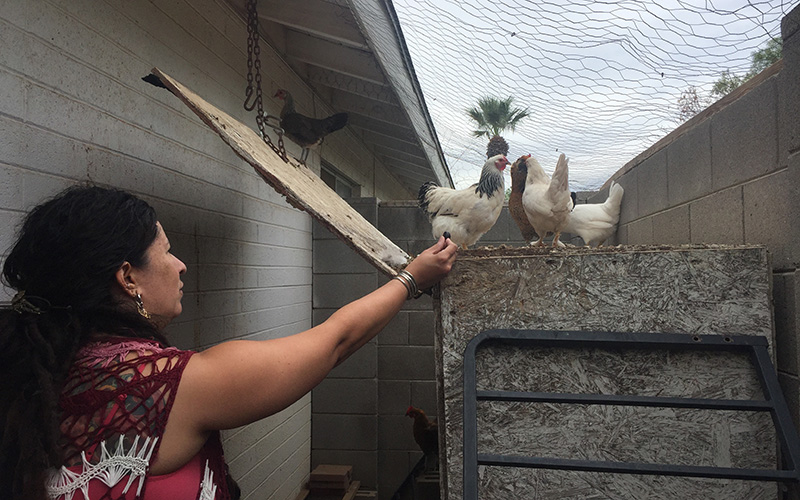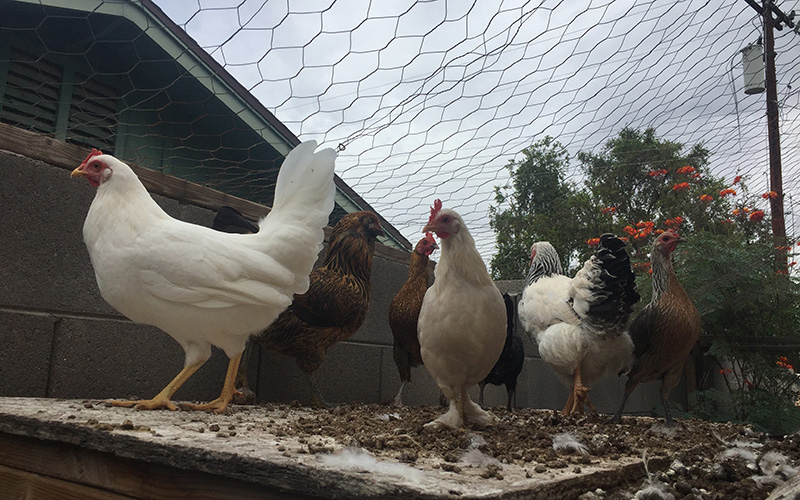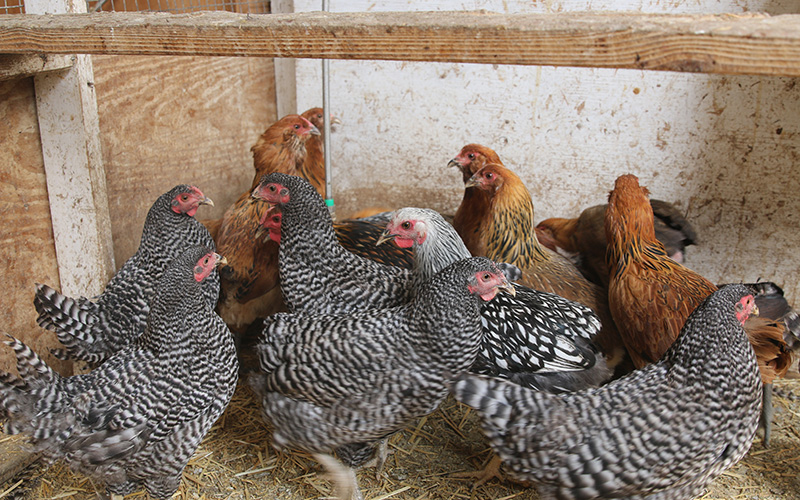GLENDALE – Chickens scratching, clucking and laying eggs in neighbors’ backyards could become more frequent under a proposed change to a Glendale ordinance, setting the groundwork for an anti-chicken and pro-chicken battle over lifestyle, property rights and the environment.
On one side: supporters of an urban farming ethos who believe raising chickens leaves a sustainable footprint and cultivates a backyard-to-table movement of fresh eggs.
On the other side: advocates of a poultry-free neighborhood who seek quiet, want cleanliness and believe a backyard full of chickens would drive down property values.
Accusations, counter-accusations and rumors have marked the controversy since it was proposed several months ago and has yet to be scheduled for a meeting before the Glendale City Council. A Glendale chicken owner, Shelly Honn, said she asked for the proposal to change the chicken-ownership ordinance after a neighbor complained.
Under the amendment, people living in areas zoned for single-family homes would be able to keep an unlimited number of chickens in backyards of at least 4,000 square feet. That would slice the square footage to one-third the size required now.
Here’s what the anti-chicken and pro-chicken contingents had to say about the proposal:
Chickens stink, carry disease and mess up neighborhoods
“Contrary to what the pro-chicken people want you to believe, chickens do smell,” said Realtor Michele Tennyson. “Chicken poop does smell quite a bit, and unless you are going to have someone to patrol and clean those coops on a daily basis, that is going to be an offensive odor.”
Tennyson carries a file of opposition documents, saying chicken feces carries the potential for E. coli and salmonella bacteria.
Chickens “also attract flies, rats, birds of prey, and coyotes,” Tennyson said.
Then, there’s the noise.
“If you’ve got a chicken coop and your neighbor complains about the noise, are you going to take 20 chickens inside with you at night or during the day when you are at work? I don’t think so,” Tennyson said.
Hens and residential neighborhoods don’t mix, Penny Knochenhauer agreed. She, Tennyson and neighbor Connie Kiser spoke about the chicken controversy at Knochenhauer’s upscale Arrowhead Ranch home. Knochenhauer said she moved into an HOA-regulated development three decades ago precisely to avoid neighborhood nuisances.
“This is a residential area and our neighbors are very close,” she said. “I back up to four houses, and chickens fly. I could see chickens just flying over the fence into my neighbor’s yard.”
City officials said those living under Home Owner’s Association regulations would be exempted under the law – only the HOA could allow chickens – but at least one resident was not placated.
Connie Kiser, who also lives in Arrowhead Ranch, said her rights would still be violated.
“I think the city has not thought this out, and it affects the property rights of anyone who chose to live in a residential area that doesn’t allow chickens,” Kiser said.
Bottom line: Tennyson and members of community believe chickens, especially an unlimited number, would depreciate a neighborhood’s property values and deplete the lifestyle.
“If I’m showing a house and there is a chicken coop coup next door…we’re not going to spend more than five seconds in that house,” Tennyson said.
Chickens are environmentally friends and provide fresh eggs
Phoenix resident Rebecca Buck, whose home nestles on the Glendale border, said she has raised chickens for nearly four years without predators attacking the birds.
“There is a hawk that lives in the alley, and the hawk doesn’t seem to care,” Buck said. “It’s more interested in my tiny dogs than in my birds.”
Nate Infurna, general manager of Pratt’s Pets and Feed in Glendale, said hens are quieter than people might think.
“One of the common misconceptions with poultry is that they are loud,” Infurna said. “Poultry are actually quiet at night. They don’t make any sounds, they roost, they don’t have the nuisance of noise like that of a barking dog.
“During the day, the sound that they make when laying an egg is typically the only sound you’ll hear, Infurna said. “That’s a happy hen cluck.”
And hens clucking won’t be heard by even a next-door neighbor, he said, comparing it to the annoyance of a dog barking.
Infurna said the smell and noise levels of chickens is determined by how often owners clean coops.
“Some of the cons of backyard poultry that you’ll commonly hear are that they are noisy, they’re smelly, they’re dirty, but that’s all relative to the upkeep of the animal,” he said. “If the coup is kept clean, and chickens are fed, they usually aren’t very loud.”
Infurna said the chance of humans contracting a chicken-borne illness is rare as long as people keep the area clean and wear gloves.
Bottom line: The best reason to keep hens is they’re a way to help the environment, Buck and Inferna said.
“People are able to reduce their carbon footprint,” Infurna said. “Once of the easy ways to do that is to raise five or six hens in their backyards. It take a minimum amount of feed, a minimum amount of cage space, and they can get fresh eggs daily.”
Buck said getting fresh eggs from her hens is better than buying cartons from the local grocer.
“The eggs taste better, they taste different, they are substantially fresher,” she said. “I think that everyone should be slightly more responsible for their household and how they feed themselves.”
Separating fact from rumor
Rumors and misconceptions have been flying about the proposed ordinance. Basically, the amendment specifically states there are no limits on the number of chickens and the backyard size requirement is being reduced from 12,000 square feet to 4,000 square feet, Thomas Ritz, a senior planner in Glendale, said in an email.
These changes will “allow residents to raise chickens in all single-family residential zoning districts of the city,” Ritz wrote.
Roosters would still not be allowed under the ordinance change.
The revised law, under the proposed amendments, would not affect Home Owners Association covenants, which can still ban chickens, Ritz wrote.
“One of the common misconceptions of the zoning amendment that we hear is that people who live currently in HOAs have to abide by the city zoning changes, and that they would have to allow poultry in that area,” Pratt’s Infurna said. “It is actually not true at all.”
(Video by Katelyn Greno/Cronkite News)

